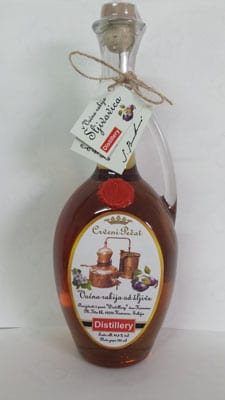Production is dominated by rakija brandy from quince, followed by plum, apricot, pear, honey, herbs, gentian, William’s Pear, pelinkovac bitters and liqueurs from green walnuts. Besides their distinctive taste and aroma, these products are characterised visually by the design of the specific form of ethno packages that are defined by a wooden stopper, carafe bottle, sealing wax and thread
Distillery Kumane produces fruit brandies in accordance with the Law on Food Safety and the Law on Alcoholic Beverages, with respect for HACCP principles and the principles of Traceability and the identification of products. This production is traditional – classical technology without aroma and colour additives using healthy and ripe examples of different varieties of fruit.
After fermentation has been completed, double distillation is carried out in copper stills with dephlegmators, after which the distillates are transported to stainless steel containers for ageing and maturing rakija. After a minimum period of two years, diluting is carried out with distilled water to ensure the specific strength of the beverage. After this stage, the brandy obtained is tested in accredited laboratories prior to being made available for sale.
It is coming up to a decade since you founded the Distillery Kumane, on the slopes of the Carpathian Mountains in the Braničevo District. Given that this is a region known for vegetable crops, what made you opt for fruit processing?
My love for processing fruits intensified during the seven years I worked at the factory Bambi, on its advanced fruit processing plant, where I worked as a technologist. Taking into consideration the fact that an extensive form of rakija brandy production in copper cauldrons, mainly from plums and grapes, has been present in my family for more than a century, my intention was to work with fruit to create something “personal”; something that represents a kind of stamp, the crown of professional work, and which gives additional meaning to the existence of a man. This is also confirmed in the product declaration, which is dominated by a unique red wax seal, a crown and my personal signature.
The most specific, as far as aroma, flavour and smell are concerned, is the pear brandy (kruškovača), which we create by processing old indigenous varieties of pears from trees that are more than a century old and which are not protected by pesticides
What is the manufacturing capacity of Distillery Kumane today and where can your brandies be bought? Which brandy would you recommend?
Total annual production is around 20,000 litres of fruit brandies, which we have exported continuously to Romania since 2010, as one of the largest sellers of non-industrial brandies. At Belgrade’s Nikola Tesla Airport we sell our products within the Dufry shops, as well as selling on the Serbian market through the system of Mercator-S, Univerexport and other 260 outlets (hotels, restaurants, shops).
 When it comes to recommendations for the type of brandies, the most specific, as far as aroma, flavour and smell are concerned, is the pear brandy (kruškovača), which we create by processing old indigenous varieties of pears from trees that are more than a century old and which are not protected by pesticides. Here we single out the varieties Vodnjika, Lubeničarka, Takiša and Kaluđerka, which we purchase in southern Serbia. The most delicious is apricot brandy (kajsijevača), with an intense and lush varietal aroma that quince brandy (dunjevača) does not have, but which is characterised by a very pleasant taste. Then there is herb brandy (travarica), which contains 13 softened types of medicinal plants purchased from the renowned Josif Pančić Institute and which not only possesses organoleptic qualities, but also health potential.
When it comes to recommendations for the type of brandies, the most specific, as far as aroma, flavour and smell are concerned, is the pear brandy (kruškovača), which we create by processing old indigenous varieties of pears from trees that are more than a century old and which are not protected by pesticides. Here we single out the varieties Vodnjika, Lubeničarka, Takiša and Kaluđerka, which we purchase in southern Serbia. The most delicious is apricot brandy (kajsijevača), with an intense and lush varietal aroma that quince brandy (dunjevača) does not have, but which is characterised by a very pleasant taste. Then there is herb brandy (travarica), which contains 13 softened types of medicinal plants purchased from the renowned Josif Pančić Institute and which not only possesses organoleptic qualities, but also health potential.
In conclusion, all of our fruit brandies, poetically speaking, as noted in the declaration, fully captivate and enchant all of our senses, starting from their unobtrusive subtle scent, opalescent transparency in the glass, their beneficial and pleasant taste that lasts and is maintained even after ingestion of the drink, after which it creates a fine pleasant warmth in our body which differs from previous experience and does not leave us feeling indifferent, and which generates an overall feeling of happiness and satisfaction, returning us to early childhood and our carefree play in fragrant rural meadows and orchards.